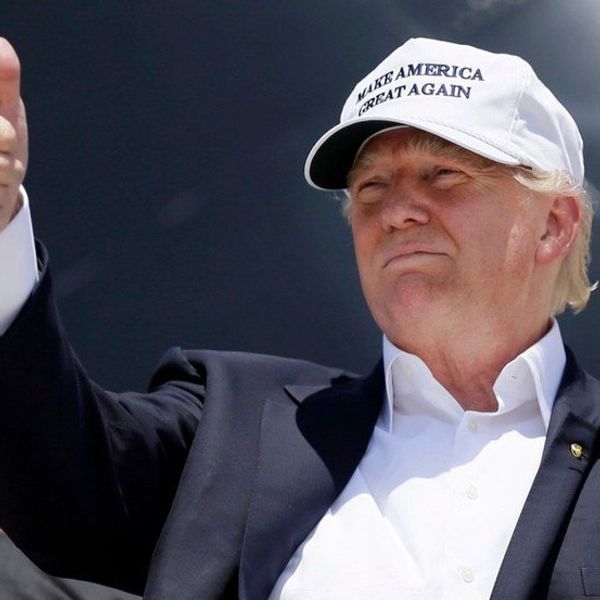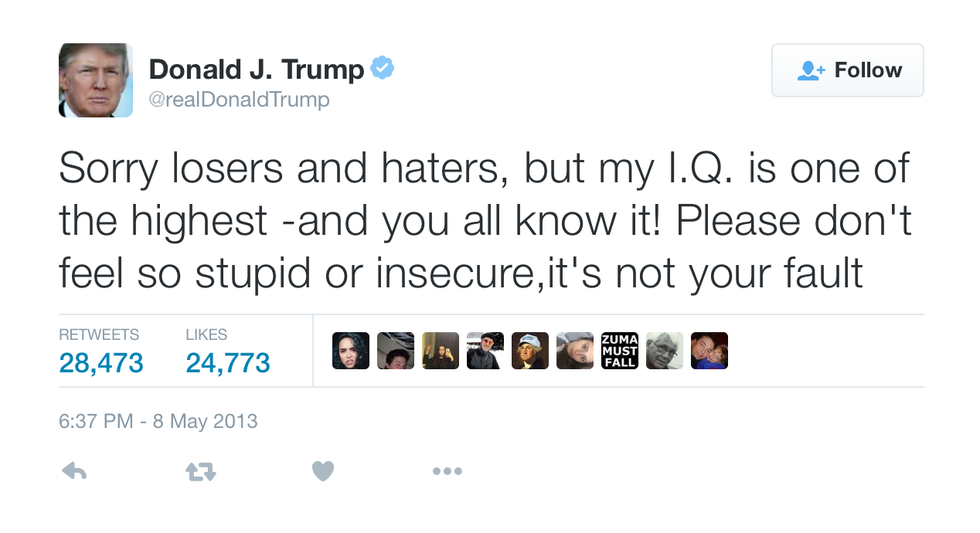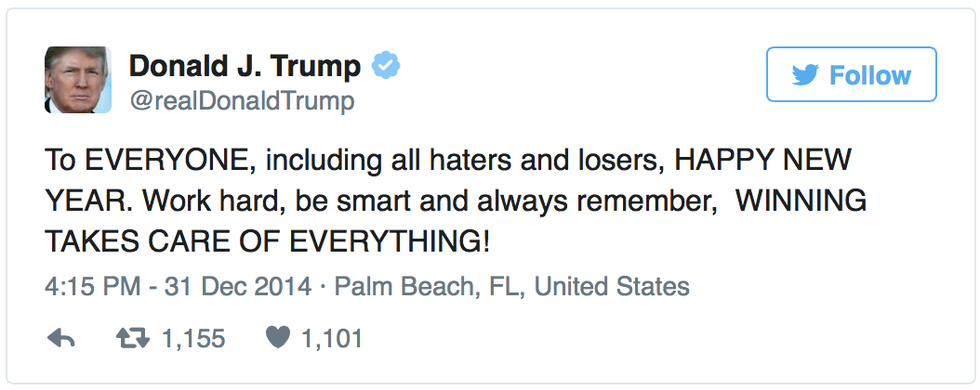I have to admit, I've been baffled by how much support Donald Trump has rallied since he first announced his candidacy (which many people, at first, laughed off as a joke). I've watched focus groups with Trump supporters to try to understand it, but something still didn't make sense.
So, I turned to social psychology and found the answer: Four concepts—right out of the textbook—that explain the remarkable and surprising success of Donald Trump as a presidential candidate:
There’s a concept known as BIRG, or Bask In Reflected Glory.
This concept explains that people associate with others who are successful to boost their own self esteem. Trump centers his whole campaign over the idea that he is a “winner.” To do this, he also emphasizes that his opponents, his “haters,” and even random celebrities and reporters are “losers.” He repeats this dialogue in many of his tweets and during interviews and speeches. Perhaps people identify with Trump in the same way that people might identify with a winning sports team—they like to win. They may identify with the idea of winning and align themselves with Trump, who is very committed to winning and is very confident in his ability to do so.
A sketch on Jimmy Kimmel Live! that depicts Trump being a "winner" and disparaging "losers."
So who exactly are these Trump supporters? According to Real Clear Politics, Trump supporters tend to be “a bit older, less educated, and earn less than the average Republican.” More than one-third of his supporters earn less than $50,000, and only 11 percent earn more than $100,000. Perhaps these people associate themselves with Trump, a wealthy businessman, because doing so raises their own self-esteem. We can try to examine these demographic statistics all we want, but Politico reporter Matthew MacWilliams just blew it all out of the water. In his recent article, he proposed that the main predictor of whether someone will support Trump is if they have authoritarian inclinations. Again, this points to BIRG—people want a strong leader to associate with in order to boost their self-esteem. It's not surprising that Trump likes Vladimir Putin because Putin uses the same tactic to appeal to the Russian people.
Another potential explanation is the "mere exposure effect."
The mere exposure effect is the phenomenon whereby the more an individual is exposed to a stimulus, the more positively they evaluate that stimulus. Several studies have been done to support this claim. A popular example is the fact that people generally prefer their mirror images, while their friends prefer the actual photos of their appearance. This is because we are usually exposed to our mirror image, whereas others see the reverse view. I think we can all agree that Trump gets far more than "mere exposure." In fact, he gets more attention than any of the other presidential candidates, and that undoubtedly explains why he's winning in the polls. According to television news analyst Andrew Tyndall, Donald Trump has gotten a total of 327 minutes of airtime on the ABC, CBS, and NBC evening news shows. This is nearly three times as much coverage as the Democratic front-runner Hillary Clinton has gotten (121 minutes), and the campaigns of other Republican candidates didn’t even make Tyndall’s list of top news stories covered. Perhaps the substantial airtime Trump has gotten (a whole year before the general election) is why such a large proportion of Republican voters support him.
Another concept from social psychology that could possibly explain Trump’s support is called "social dominance orientation."
Social dominance orientation is defined by Saul Kassin, Steven Fein and Hazel Rose Markus in the ninth edition of Social Psychology as "a desire to see one’s in-group as dominant over other groups and a willingness to adopt cultural values that facilitate oppression over other groups.” One of the biggest campaign platforms that Trump has been running on is to ban all Muslims from traveling to the United States. Another large campaign idea is to “build a wall” to keep immigrants out of the country. He has also made disparaging comments about African Americans and women. This is not to say that all of Trump’s supporters are racist or sexist, but it is true that many of Trump’s supporters are white men. Trump also does particularly well among non-educated white men. Donald Trump is a white male and often makes comments that imply that his “in-group” is superior to other racial groups and women. Trump has made some insensitive and offensive comments which could be appealing to people who enjoy seeing their in-group as dominant over other groups.
Trump is also gaining supporters by capitalizing on another social psychology concept called the "peripheral route to persuasion."
When trying to convince someone of something (in Trump's case, why he should be president), there are two main ways of doing so: the central route and the peripheral route to persuasion. The central route typically consists of strong, high-quality arguments and requires active listening and comprehending by the audience. Meanwhile, the peripheral route occurs when people are persuaded on the basis of things other than the content of the argument. The characteristics that may contribute to the peripheral route of persuasion include the length of the argument, the prestige and character of the speaker or the presentation of the argument. People tend to take the peripheral route to persuasion when they aren't fully invested in a topic or when they don’t have a strong understanding of it. Many of Trump's supporters are "irregular voters," or people who are not fully invested in politics. These people look at Trump and see someone who owns a successful business and who isn't a "typical" Washington politician. They seem willing to support him regardless of the specifics, or lack thereof, of what he is proposing.
Trump himself seems fully aware of this last point. Just look what he recently said at one of his rallies in Iowa -- "I could stand in the middle of fifth avenue and shoot somebody and I wouldn’t lose any voters, ok? It’s like incredible.” He just might be right about that.























